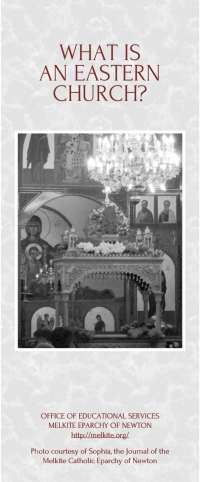 |
HISTORY OF THE MELKITE CHURCH
The Melkite story goes back a long way: to the very dawn of Christian history. The Melkites, or Byzantine (Greek) Catholics of Middle Eastern origin, are descendants of the early Christians of Antioch (Syria).
Today the term Melkite is used to refer to those Catholics whose ancestry is Middle Eastern and who follow the Byzantine Tradition in worship, theology, and spirituality. As Rome was the most powerful city in early Western Europe and spread her manner of worship throughout the supponding area, so too the Greek capital, Constantinople (originally called Byzantium), spread her traditions and customs to the countries closest to her. |
 |
THE EASTERN CHURCH
At the time of the early Church, there were several rich cultures in the Middle East and each of them has given rise to a different church tradition. The traditions of this church reflect the Greek or Byzantine culture, and so we are called Greek Catholics or Byzantine Catholics (from Byzantium, the ancient name for Constantinople).
Greek Catholics in the Middle East were also nicknamed ‘Melkite’, because they followed the faith of the Byzantine emperor, or ‘melek’.
|
 |
OUR CHURCH’S MANY NAMES
In the Western world today our Church is called Melkite Greek Catholic (Grec Melchite Catholique), as is explained below. In the Middle East we are generally known as Room Katuleek, literally “Roman Catholic”, just as those whom we call Antiochian or Greek Orthodox here are known as Room Orthodox (“Roman Orthodox”) there. However the Rome they are referring to in these titles is not the Rome in Italy, but Constantinople, which the ancients called New Rome.
Those whom we call Roman Catholics here are known as Lateen (Latins) overseas.This often causes confusion when immigrants arrive from the Middle East and, with a literal translation, speak of themselves as Ro- man Catholics when they actually mean Room Katuleek. It is also confusing for others who come to our churches and are confronted with the multitude of names our Church uses. |
 |
OUR PATRIARCH
Vatican II recognizes the Patriarch as Father and Head of the Church over which he presides together with his synod of bishops. As supreme arbitrator in liturgical and discipline matters, the Patriarch serves as a unifying force for his flock which is scattered over the world.
For most of the last millenium, the Patriarchate of the West has been separated from its sister Churches in the East. As a result, Western Catholics began to blur the distinction between the two roles of the Pope of Rome: as Patriarch of the West and as first hierarch of all the Churches.
|
 |
ANTIOCH CROSSROADS OF FAITH
In the first century, cities such as Jerusalem, Antioch, and Ephesus held faith-filled communities bound together in one rapidly growing Church. Unknown to them, they were only the first steps on the road which would take Christianity around the world. Antioch was a vital crossroad in the journey. Directions chosen there have guided the spread of faith down to our day.
Its location destined Antioch to be a mixture of diverse cultures. Caravans from Asia Minor, Persia, In- dia, and even China traveled through this natural meet- ing place for East and West. Merchandise from afar was sent to large warehouses before being transferred to barges and hauled down the Orontes River to waiting ships.
|
 |
ANTIOCHIAN UNITY
Antiochian Christians all look forward to the day when the Melkite Greek Catholics and the Greek Orthodox in the Antiochian patriarchate return to being one Church and one patriarchate. They affirm to all that this reunification does not mean a victory of one church over another, or one church going back to the other, or the melting of one church into the other. Rather, it means putting an end to the separation between the brothers that took place in 1724 and led to the existence of two separate independent patriarchates, and returning together to that unity that prevailed in the one Antiochi- an patriarchate before the separation.
|